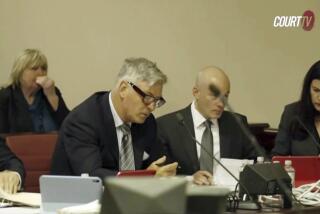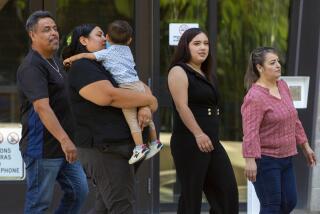As James Holmes’ trial winds down, witnesses’ common refrain: Loss
It didn’t matter what prosecutors asked during the final two days of testimony in James E. Holmes’ trial. Every witness gave the same answer: This is the hole he blasted through my heart, my family, my life.
What do you miss most? How did you hear the news? What is different about your existence today? Do you celebrate Christmas anymore? And who is that in the picture up on the screen, that smiling young woman with a microphone, that young sailor in uniform, that jaunty 27-year-old with sunglasses on his head, “man tiara” style.
He’s gone. She’s gone. They’re all gone. What’s it like?
“I just feel like my family’s broken,” sobbed Ciera Camille Cowden, 19. Her father, Gordon, was shot to death at her side on July 20, 2012, when Holmes burst into a midnight screening of “The Dark Knight Rises” and began blasting away.
“I am now the single mother of one child,” said Mary Theresa Hoover, whose son, Alexander Jonathan “A.J.” Boik, died in Theater 9 of the Century 16 multiplex in Aurora, Colo. “I’ve lost half of what I was put on this Earth to do, raise my children.
“He was one of the two best things I ever did,” said Hoover, who sold the townhouse where her boys grew up because she could no longer bear to live there. “Now, my life is basically half of what it was.”
Sandy Phillips walked to the witness stand, wrapped, as always, in her dead daughter’s bright green scarf. It is a tangible memorial to the budding sports broadcaster, a fabric embrace from the child she no longer has.
“I have PTSD, and my brain is mush,” said a tearful Phillips. “I cry every day. Still. I probably always will. My husband ...”
She paused. The man who killed her “beautiful baby girl, Jessica Redfield Ghawi,” was seated at the defense table just feet from the witness stand. He had already been convicted on 165 counts, including murder and attempted murder, in the theater rampage that took 12 lives and left 70 others wounded.
“My husband is everything,” Phillips continued. “And between the two of us we hold on. We redefine ourselves. We live very much in the moment. Obviously we’re both older. My husband is 71. I’m 65. We don’t plan on a future anymore.”
The final phase of Holmes’ death penalty trial unfolded this week in Division 201 of the Arapahoe County Justice Center in Centennial, Colo. The families of Holmes’ victims spent two days telling the jury what life is like, now. They broke down in tears; so did jurors.
Enough of them that defense attorney Tamara Brady, after the victim impact statements ended Wednesday, rattled off seat numbers for more than half the panel whose eyes had been filled with tears.
“I only noticed a couple of folks, No. 20 and 21,” responded Judge Carlos A. Samour Jr., who said he was not unduly worried. “Those are the couple of folks that cried at different times, perhaps on four occasions yesterday and today. ... I did not notice any of the other ones.”
Attorneys are scheduled to give their closing arguments Thursday afternoon. And then jurors will decide whether the gunman should live or die. Holmes has chosen not to address the jury at any point in the lengthy proceedings, which began April 27.
The witnesses — parents, children, siblings, a grandfather — talked about memorial services that drew thousands, bright smiles they will never see again, futures swiftly ended amid blood and screams in a darkened movie theater.
Caren Teves’ son Alex was shot to death after he threw himself between girlfriend and gunfire. Teves has Parkinson’s disease, an ailment that worsens with stress, she said Wednesday, and has “progressed quite rapidly since the massacre.”
“I did not realize that grief turns into physical pain,” she said on the witness stand. “It hurts your entire being, but it also gives you physical pain, pain every single day. It’s God awful, just horrific. I miss everything about him.”
These days, she said, she has one fear.
That she will not remember the sound of her son’s laughter.
More to Read
Sign up for Essential California
The most important California stories and recommendations in your inbox every morning.
You may occasionally receive promotional content from the Los Angeles Times.










